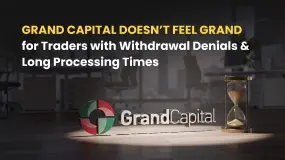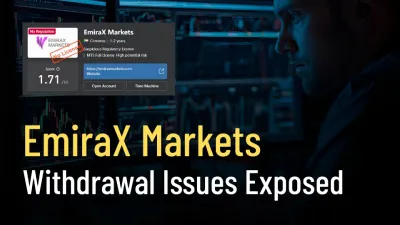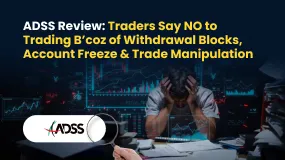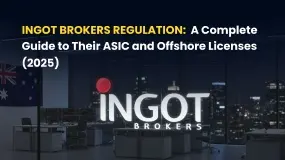简体中文
繁體中文
English
Pусский
日本語
ภาษาไทย
Tiếng Việt
Bahasa Indonesia
Español
हिन्दी
Filippiiniläinen
Français
Deutsch
Português
Türkçe
한국어
العربية
GIM, Something You Need to Know About This Broker
Abstract:GIM, a broker registered in New Zealand, claims to offer trading services with a trading experience of 5-10 years. However, a deeper analysis reveals a plethora of red flags that potential investors should be wary of before committing their funds.

GIM, a broker registered in New Zealand, claims to offer trading services with a trading experience of 5-10 years. However, a deeper analysis reveals a plethora of red flags that potential investors should be wary of before committing their funds.
Unregulated Status
One of the most concerning aspects of GIM is its lack of regulation. While the broker cites a license from the Financial Service Providers Register (license number 397146), this license is widely regarded as a suspicious clone. This means that GIM is not operating under legitimate regulatory oversight, which is crucial for ensuring the safety and security of traders' investments. Without regulatory scrutiny, clients have no recourse in the event of disputes or fraudulent activities.

Lack of Trading Software
Another significant issue is the absence of trading software. Reliable brokers typically provide their clients with access to established trading platforms that facilitate smooth and efficient trading. The lack of such tools not only raises concerns about GIM's operational legitimacy but also limits traders' ability to engage in the market effectively. This absence is a strong indicator that GIM may not be equipped to support genuine trading activities.
Disappearance of Physical Presence
Adding to the concerns, WikiFX's on-field survey team conducted an investigation to locate GIM's claimed office but found no trace of it. This inability to verify the broker's physical presence is a serious red flag, suggesting that GIM may be operating without a legitimate base of operations. It raises questions about accountability and the broker's overall credibility.

Ponzi Scheme Allegations
Perhaps the most alarming classification of GIM is that of a Ponzi scheme. In this context, the broker is accused of utilizing a “principle of value multiplication,” wherein the funds from new members are used to pay returns to earlier investors. This creates a facade of profitability while perpetuating a cycle of deception. Essentially, GIM operates as a pyramid scheme, disguised in a way that exploits individuals desires for quick financial gains. Such schemes often lure investors with the promise of high returns, but the reality is that they are built on unsustainable practices and rely on a constant influx of new funds.
Historically, Ponzi schemes tend to implode within 1-2 years, leaving behind devastated investors. The fundraising model of such platforms is inherently unstable, typically existing for less than three years before collapsing. Given the alarming signs surrounding GIM, potential clients must approach this broker with extreme caution.
Scam Broker Listing
Due to the numerous concerns surrounding GIM, it has been included on WikiFX's Scam Brokers list. The low score of 1.56/10 reflects a lack of trust and reliability. In the WikiFX comment section, traders have shared their negative experiences, with at least one reported case of scamming. This collective feedback serves as a warning to potential investors about the risks associated with GIM.

Conclusion
GIM poses significant risks for anyone considering investing with them. Its unregulated status, lack of trading software, absence of a verifiable physical presence, and classification as a Ponzi scheme all contribute to a troubling picture. Investors are strongly advised to conduct thorough research and consider safer, regulated alternatives before making any financial commitments. The allure of quick returns can be enticing, but as GIM illustrates, the cost of falling prey to such schemes can be devastating. Always prioritize safety and due diligence in your trading endeavors.

Disclaimer:
The views in this article only represent the author's personal views, and do not constitute investment advice on this platform. This platform does not guarantee the accuracy, completeness and timeliness of the information in the article, and will not be liable for any loss caused by the use of or reliance on the information in the article.
Read more

Grand Capital Doesn’t Feel GRAND for Traders with Withdrawal Denials & Long Processing Times
The trading environment does not seem that rosy for traders at Grand Capital, a Seychelles-based forex broker. Traders’ requests for withdrawals are alleged to be in the review process for months, making them frustrated and helpless. Despite meeting the guidelines, traders find it hard to withdraw funds, as suggested by their complaints online. What’s also troubling traders are long processing times concerning Grand Capital withdrawals. In this Grand Capital review segment, we have shared some complaints for you to look at. Read on!

EmiraX Markets Withdrawal Issues Exposed
EmiraX Markets Review reveals unregulated status, fake license claims, and withdrawal issues. Stay safe and avoid this broker.

ADSS Review: Traders Say NO to Trading B’coz of Withdrawal Blocks, Account Freeze & Trade Issues
Does ADSS give you plenty of excuses to deny you access to withdrawals? Is your withdrawal request pending for months or years? Do you witness account freezes from the United Arab Emirates-based forex broker? Do you struggle to open and close your forex positions on the ADSS app? Does the customer support service fail to respond to your trading queries? All these issues have become a rage online. In this ADSS Broker review article, we have highlighted actual trader wordings on these issues. Keep reading!

INGOT Brokers Regulation 2025: ASIC vs Offshore License - What Traders Must Know
Explore INGOT Brokers regulation in 2025: Compare their ASIC and Seychelles FSA licenses, understand trader protection levels, and learn about potential risks in this detailed guide.
WikiFX Broker
Latest News
Mitrade Arabic Platform Targets MENA Gold Trading Boom
Israeli Arrested in Rome Over €50M Forex Scam
New FCA Consumer Alert 2025: Important Warning for All Consumers
EmiraX Markets Withdrawal Issues Exposed
Global Guide to Finding Forex IBs/Brokers — Share Your Pick and Win Big!
Consob Targets Political Deepfake “Clone Sites” and Unlicensed Platforms in Latest Enforcement Round
WikiEXPO Global Expert Interviews: Gustavo Antonio Montero: ESG in Finance
Trump tariffs are helping drive U.S. beef prices to new highs
Scam Alert: GINKGO-my.com is Draining Millions from Malaysians!
Trading Pro Review: Scam Broker Exposed
Currency Calculator



